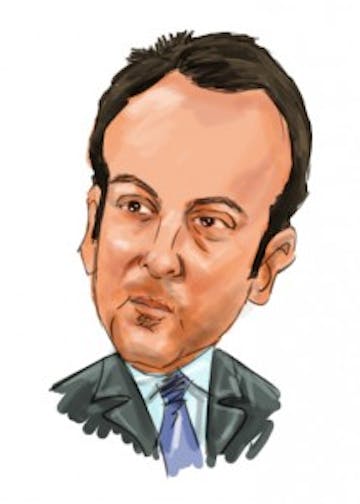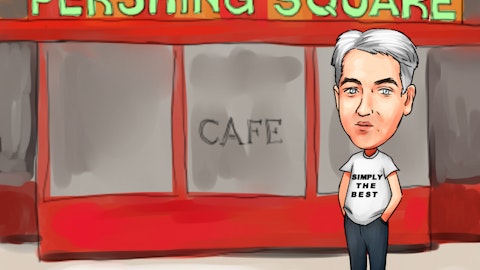
If hedge fund manager Eddie Lampert wants to save one of the oldest retail empires in the United States, he should consider shutting down Sears Holdings Corp’s Kmart discount chain and focus on revamping its Sears department stores. “Trimming down a hundred stores is like rearranging deck chairs on the Titanic,” said Craig Johnson, president of retail strategy and consulting firm Customer Growth Partners, whose clients include J.C. Penney Co Inc and Toys R Us. “This is a company that needs not just cosmetic surgery, not just minor surgery, but radical surgery.” “The hurdle is going to be when one of the suppliers for a category that is important to them says we want letters of credit to back our receivables, at which point the unused bank lines get used very fast,” said John Hempton, chief investment officer of a small hedge fund, Bronte Capital, in Australia. He has a short position on Sears.
Sears Turnaround Means Using Tech, CEO Says (Bloomberg)
Lou D’Ambrosio, chief executive officer of Sears Holdings Corp. (SHLD), said creatively combining technology with spending on stores is the best way to turn around the largest U.S. department store chain. Chairman Edward Lampert, who along with his hedge funds owns 60 percent of Sears, has attempted multiple turnaround strategies that have failed to reverse a slide in sales. D’Ambrosio is the fourth CEO since Lampert merged Sears with Kmart in 2005.
Why Hedge Funds Tripped In A Volatile Year (WSJ)
Many of the hedge-fund managers who came into 2011 riding a wave of momentum ended the year scratching their heads and nursing losses, whipsawed by markets that seemed to punish them month after month. Take billionaire hedge-fund titan John Paulson, arguably the industry’s biggest star and one of the wealthiest people in the world after making billions of dollars in 2007 with bearish bets on subprime mortgages. Mr. Paulson began 2011 on a high note, having personally scored more than $5 billion in profits in 2010, and was poised to make more money on big bets on gold and a speedy economic recovery. But by the end of 2011, not only had Mr. Paulson’s home on the Upper East Side in Manhattan been a target of Wall Street protesters, but the investing guru also saw his trades backfire, causing one of his biggest funds to lose about half of its value. The rise and fall of Mr. Paulson and his firm, Paulson & Co., offers a window into what was a frustrating year for many hedge-fund managers, including some of the industry’s most-storied.
Ready To Try On Mr. Buffett’s Shoes (WSJ)
It is tough to follow a legend. Ted Weschler considers himself one of Warren Buffett’s biggest admirers, but until this past summer, he couldn’t actually see himself working for the Oracle of Omaha. The spotlight and scrutiny that come with such a job simply wouldn’t be worth it. Yet this month, the 50-year-old Mr. Weschler, a hedge-fund manager based in Charlottesville, Va., will join Berkshire Hathaway Inc. to help Mr. Buffett oversee Berkshire’s $110 billion in stocks, bonds and other investments. That positions Mr. Weschler, along with 40-year-old Todd Combs, another former hedge-fund manager, as a candidate to take over, some day, a portfolio Mr. Buffett has run with unparalleled success for more than 45 years.
UPDATE 1-Canadian Pacific Dismisses Reports On CEO Replacement (Reuters)
Canadian Pacific Railway Ltd said it was still willing to continue talks with activist investor William Ackman on the company’s strategy and dismissed media reports that the railroad operator was willing to consider Ackman’s nomination for CEO. Ackman wants the company to replace CEO Fred Green with Canadian National Railway’s ex-chief Hunter Harrison. Canadian Pacific had expressed concerns over Harrison’s contract with Canadian National and his non-compete arrangements, the company’s chairman John Cleghorn said in a letter to Ackman, filed with the U.S. Securities and Exchange Commission. Cleghorn also said no Canadian Pacific board member “expressed enthusiasm for Mr. Harrison and requested a meeting with him.” “Indeed, no invitation has been extended by us to Mr. Harrison, either directly or via Pershing Square.”
Crude Oil Advances In New York As Manufacturing Expands In China And India (Bloomberg)
Oil climbed in New York after manufacturing activity expanded in China and India and investors bet that further sanctions against Iran will curb supply. Hedge funds expanded wagers on rising oil prices by 7.6 percent, or 13,585 contracts, to 192,446 in the seven days ended Dec. 27, according to the U.S. Commodity Futures Trading Commission’s Commitments of Traders report last week.
Shipping Hedge Fund Sees LNG Beating Oil (Bloomberg)
Tankers hauling liquefied natural gas at sea will earn record rates in 2012 as demand reaches an all- time high, beating returns from vessels carrying oil and coal, according to the world’s biggest shipping hedge fund. “LNG is a high-growth, high-profit industry,” said Andreas Vergottis, the Hong Kong-based research director at Tufton Oceanic (OCEHEDU) Ltd., whose research is used by the $1.45 billion Oceanic Hedge Fund, which gained 6.8 percent in the first 11 months of the year as the Lloyd’s List/Bloomberg Index of the 50 largest shipping companies (LLSIVAL) slumped 39 percent. “Next year looks even hotter. There’s not a single cloud for two years.”
Convicted Ex-Lawyer Scott Rothstein Says That Funds Didn’t Warn Investors (Bloomberg)
Scott Rothstein, the Florida lawyer sentenced to 50 years in prison for running a $1.2 billion Ponzi scheme, said officials at three Manhattan hedge funds helped him prop up the fraud in its final months, according to transcripts of a court deposition. Rothstein, 49, said his scheme began to collapse early in 2009, when he could no longer pay customers. Officials at Platinum Partners Value Arbitrage, Centurion Structured Growth LLC, and Level 3 Capital Fund agreed not to tell potential new investors he failed to make payments to them, he testified. William Scherer, an attorney for a group of investors that sued Centurion said his clients lost $180 million. The three funds sued TD Bank, a U.S. unit of Canada-based Toronto-Dominion Bank, where Rothstein claimed to have settlement funds in escrow accounts. The funds claimed bank employees gave false statements saying the accounts contained “hundreds of millions of dollars.”
Insight: West In Political Crisis Has Echoes Of 1930s (Reuters)
Dysfunctional politics threatens to deliver a protracted period of slow global growth, possibly lasting well beyond 2012, which will only deepen the political and economic problems for the West. Martin Sass, founder of the New York based hedge fund M.D. Sass with $7.5 billion under management, is among those pinning his hopes on the elections breaking the stalemate. “I never expected the level of dysfunction in the U.S. and European lawmaking … and I never saw fundamentals count for so little in the stock market. Politics and contagion were the drivers of this underperforming market, not balance sheets and earnings.” “It is going to take a new election in November (in the United States) to get any legislation through to deal with our problems,” Sass said.
Why Are Asset-Management Fees Still Rising? (WSJ)
Bankers’ bonuses are never far out of the spotlight. Yet asset managers continue to get away with charging the same lucrative fees as before the crisis – and in some cases even higher. At a time of low growth and low investment returns, these fees become even harder to justify. New European regulations will force greater disclosure on fund charges. Mutual funds also face growing competition from passive, low-cost investments like exchange-traded funds. But the only sure way to bring down fees is if investors refuse to pay them. Funds of hedge funds have cut management fees by at least half from 1.5% pre-crisis as they try to hold on to investors tempted to bypass them altogether and invest in the underlying hedge funds directly.
Bridgewater Takes Grim View of 2012 (WSJ)
Bridgewater Associates has made big money for investors in recent years by staying bearish on much of the global economy. As the new year rings in, the hedge fund firm has no plans to change that gloomy view. Robert Prince, co-chief investment officer at Bridgewater, and his managers at the world’s biggest hedge fund firm are preparing for at least a decade of slow growth and high unemployment for the big developed economies. Mr. Prince describes those economies—the U.S. and Europe, in particular—as “zombies” and says they will remain that way until they work through their mountains of debt.
Hedge Funds Like These Biotechs (Market Watch)
Just take a look at which companies are popular with hedge fund managers. They have teams of analysts examining the market constantly to figure out which companies are worth the risk. The six biotech companies on this list have seen increased hedge fund investment in both quantity and volume…
Year Ahead To See Strong HF Inflows, Agecroft Predicts (HFMweek)
The year ahead will see the strongest net flows into the hedge fund sector since 2007, according to an upbeat series of predictions issued by a leading hedge fund consulting firm. Agecroft Partners, which also offers third party marketing services, said pensions funds will be the “largest contributor” to asset growth and based its claims on “conversations with more than 300 hedge fund organizations and 2,000 institutional investors during 2011”.
DoubleLine Founder, TCW Settle (FINalternatives)
The ugly legal battle between TCW Group and its former chief investment officer, who now runs an asset management and hedge fund firm, is over. TCW and Jeffrey Gundlach’s DoubleLine Capital said Thursday that they had settled their varied lawsuits against one another, three months after a Los Angeles jury simultaneously awarded Gundlach $66.7 million in unpaid wages and found that he had misappropriated TCW’s trade secrets.
Glenview Chief Gets His Hockey Rink (FINalternatives)
Hedge fund manager Larry Robbins is moving forward with plans for his field of dreams adjacent to his New Jersey home. Robbins, the CEO of Glenview Capital Partners, has been trying to build his dream—a 120-by-85 foot ice rink—on three acres in Cresskill for more four years. But early last month, a state court judge junked a lawsuit filed against Robbins and several Cresskill officials by two neighbors, allowing the project to proceed. Robbins’ ice rink will be smaller than a National Hockey League rink, which is 200 feet long. But it will feature locker rooms and spectator seating—and cost about $10 million




